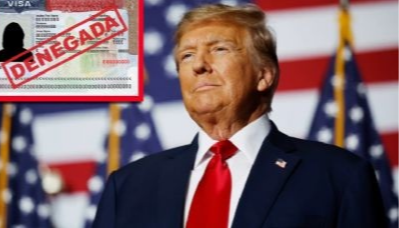
Trump's order hinders the fulfillment of the agreement with Havana to offer at least 20,000 visas annually to Cubans, a goal that has not been met for years and is now further out of reach.
By: Roberto Morejón
Many Cubans living in the Caribbean archipelago have described a recent disposition by the U.S. president as an attack against contact between families on both sides of the Straits of Florida. This new migratory veto implies a restriction on travel.
The order sparked concern among Cuban families who are separated, after they learned that Washington prohibited or restricted the entry of citizens from 19 countries into the Union.
Citing national security concerns, U.S. authorities severely restricted 12 nations and placed restrictions on seven others, including Cuba.
Cubans will not be able to choose to travel to the northern nation because the latter state is capriciously placed by the same tenants of the White House on a list of sponsors of terrorism.
They will not be able to do so, even with immigrant or nonimmigrant visas for categories such as tourism, business, study, and exchange programs.
This is yet another consequence of the Trump administration's policy to prevent foreigners from entering the United States.
Migrant communities in the United States claim to feel betrayed after voting for the Republican in the last elections, seeing that this rule has seen the light of day.
According to people with relatives in Cuba, the regulation seems arbitrary and deeply cruel because it goes against the process of family reunification.
Trump's order hinders the fulfillment of the agreement with Havana to offer at least 20,000 visas annually to Cubans, a goal that has not been met for years and is now further out of reach.
This is part of the team led by Secretary of State Marco Rubio's eagerness to tighten the siege.
Recall that the United States returned Cuba to its list of state sponsors of terrorism, from which Joe Biden had removed it. This decision is another blow to the Antillean economy.
The blockade's wide range of pressures also includes delaying or denying visas to delegations or individuals, including family reunification applicants, solely for having belonged to sectors such as health and education.
Similarly, during Trump's second term, humanitarian parole for Cubans, Venezuelans, Nicaraguans, and Haitians was revoked. This left hundreds of thousands of people in disturbing immigration limbo, facing potential expulsion.
These are all abuses and forms of coercion by those who claim that the blockade does not exist.

